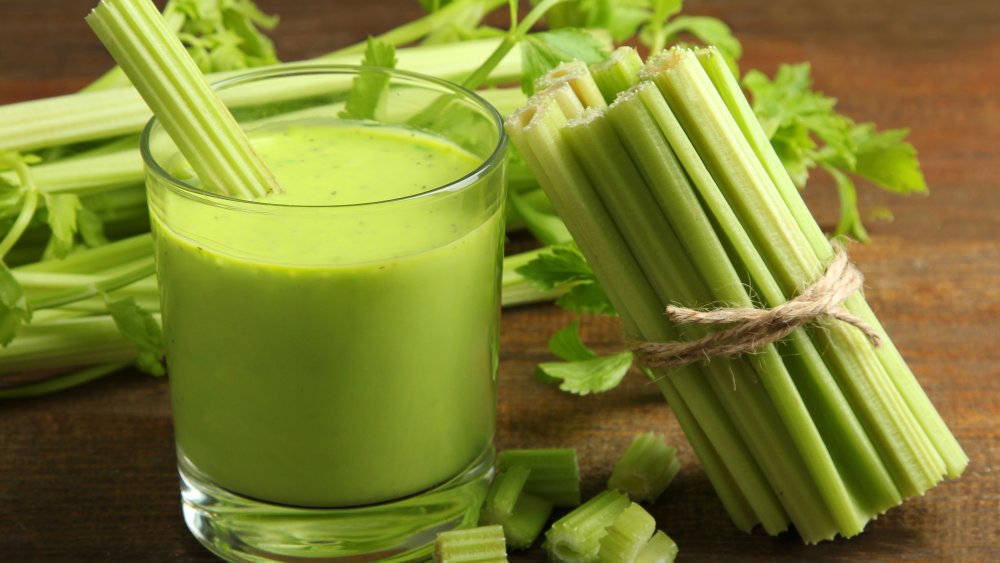Is Celery Juice Really That Healthy?
Celery juice is one of the latest health trends (if you don't believe us, take a quick browse through Instagram), and there are a lot of medical benefits that one supposedly gets from drinking it. However, when you look at the science, there are some aspects of the claims that are true, while others are unconfirmed — and even false.
Devotees of celery juice believe that it helps digestive issues, autoimmune disorders, acne, acid reflux, and weight loss, among other things (via Good Housekeeping). The self-proclaimed inventor of celery juice, Anthony William, is the source of many of these claims (via The New York Times). To get the proclaimed benefits, the celery juice must be consumed on an empty stomach.
However, there is no scientific evidence to support these claims. There are no large studies in humans, and the small amount of research that has been done was conducted on a cellular level or with animals. This is not to say, though, that drinking celery juice has no benefits. The juice is 94 percent water, so drinking it is hydrating, and people may experience positive benefits from being well hydrated.
Celery juice, overall, is a healthy drink. Just because it doesn't cure acne or cause weight loss, doesn't mean it doesn't have any benefits. It contains potassium and vitamin K in higher levels than other similar juices, such as tomato juice or carrot juice. However, it is also lacking in certain vitamins, such as vitamin A.
Celery juice versus whole celery
Celery juice contains flavones, which are antioxidant compounds. This means that it is possible that the flavones could prevent certain reactions in the body that lead to chronic inflammation, and theoretically lower your risk of chronic disease. However, this comes with a big caveat. Scientific research has not determined if the flavones are usable by the body in humans. The majority of research has been conducted in test tubes or on lab rats and is far from confirmed. It's even possible that environmental and lifestyle factors could affect whether the flavones are usable in different individuals.
In its whole form, celery has confirmed benefits. It contains antioxidants, enzymes, and phytonutrients. It also acts as a natural diuretic, allowing it to help the body flush toxins and reduce bloating. Additionally, it may have anti-inflammatory properties as well as antibacterial properties and help balance blood sugar, according to research (via Well+Good). However, juicing reduces fiber, and that is the most important part of celery, as well as in most other vegetables that people juice, such as kale.
The idea of celery juice as a miracle drink
The claims of celery juice being some kind of miracle drink originated with William, who goes by the name "Medical Medium" and is not a doctor — and has no training in nutrition. The way he gets his information is best explained in his own words: "Spirit starts to speak to me and I write every word exactly the way spirit wants it until I have a stack of notepads many feet high," he said. "It's a gift that was given to me."
Celery juice isn't known for its delicious flavor, which is usually described as grassy and salty. As such, those looking for the proclaimed benefits of celery juice are better off sticking with foods that are scientifically proven to have those specific health benefits, such as tea for antioxidants and a variety of vegetables and whole foods for the vitamins and minerals.


